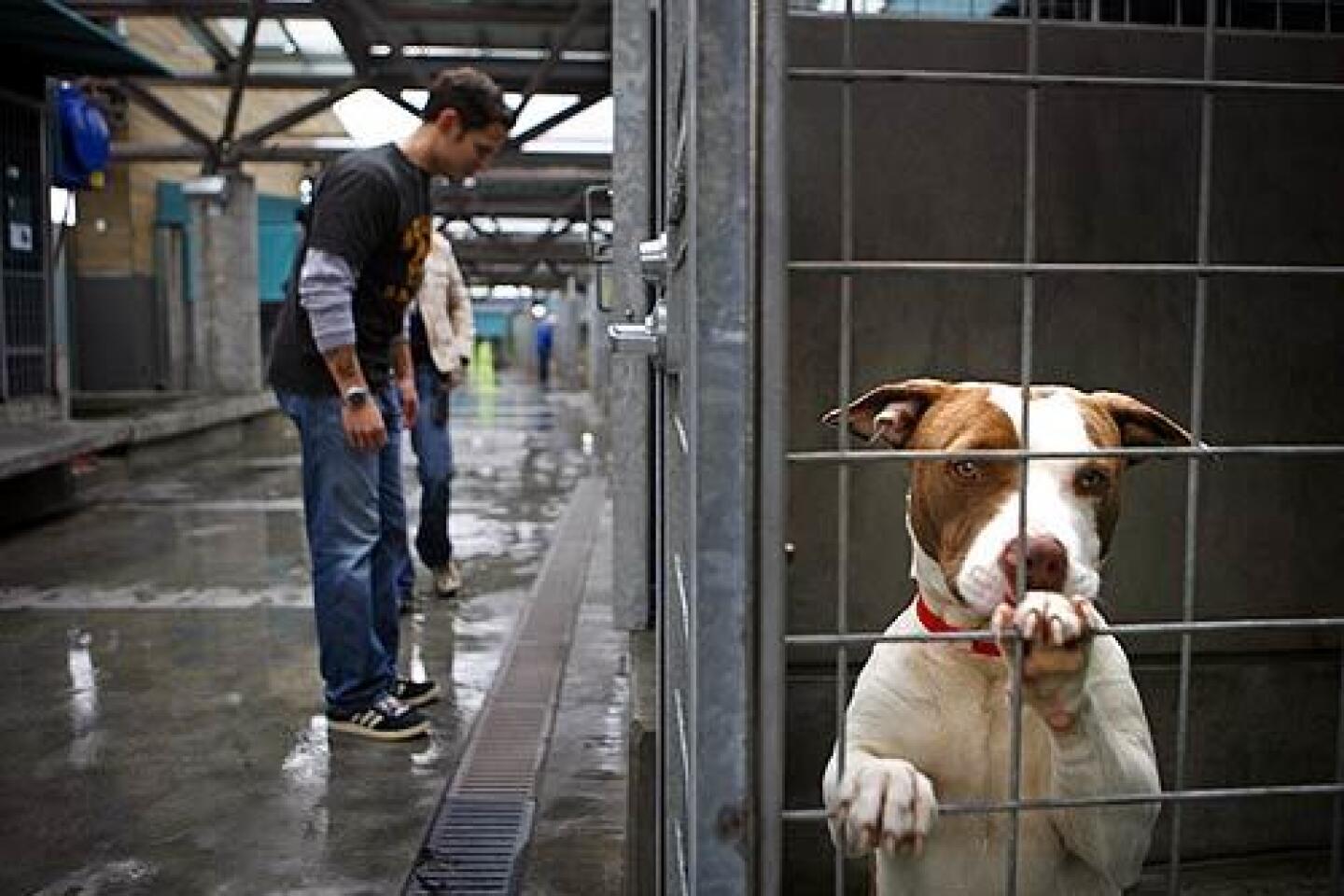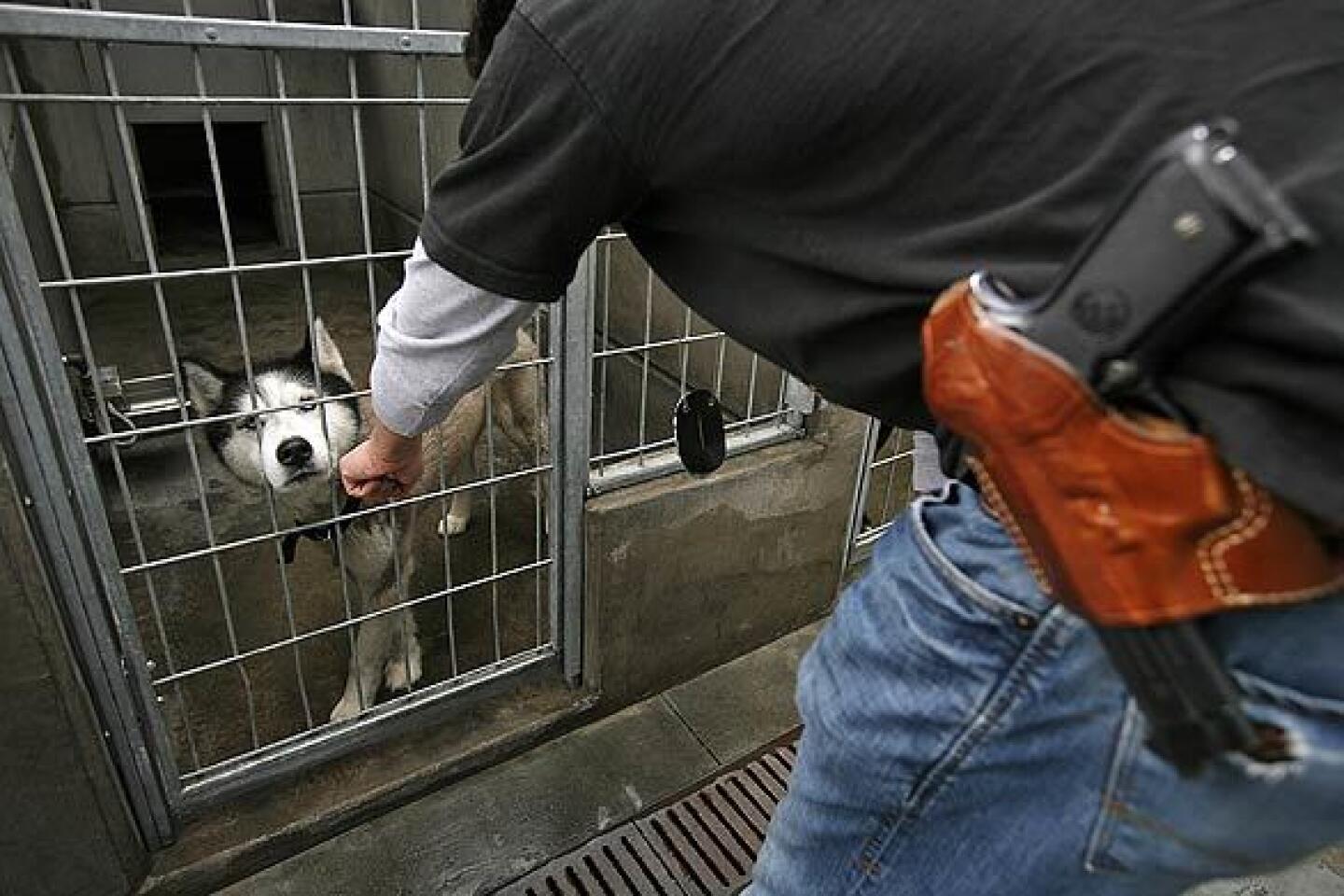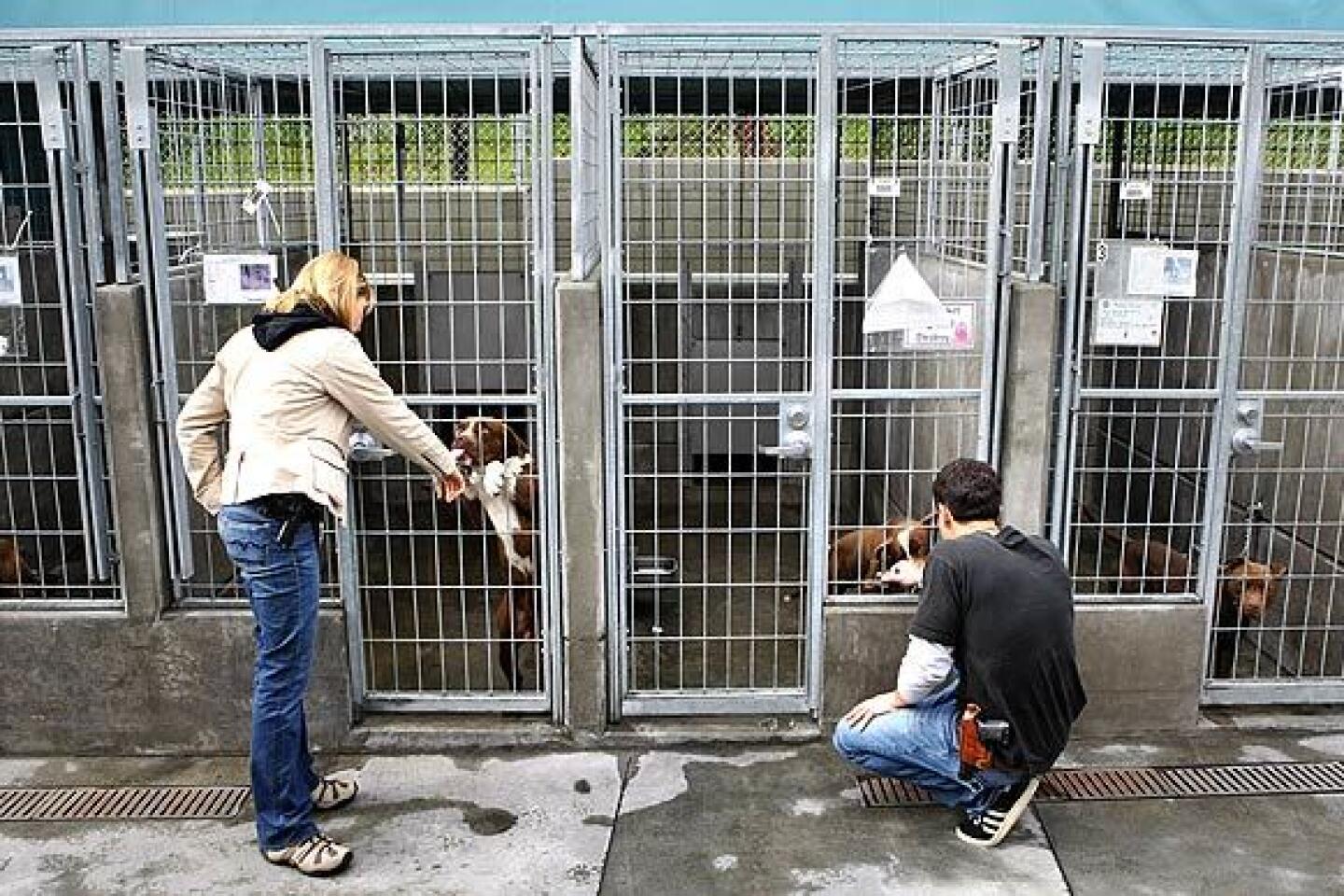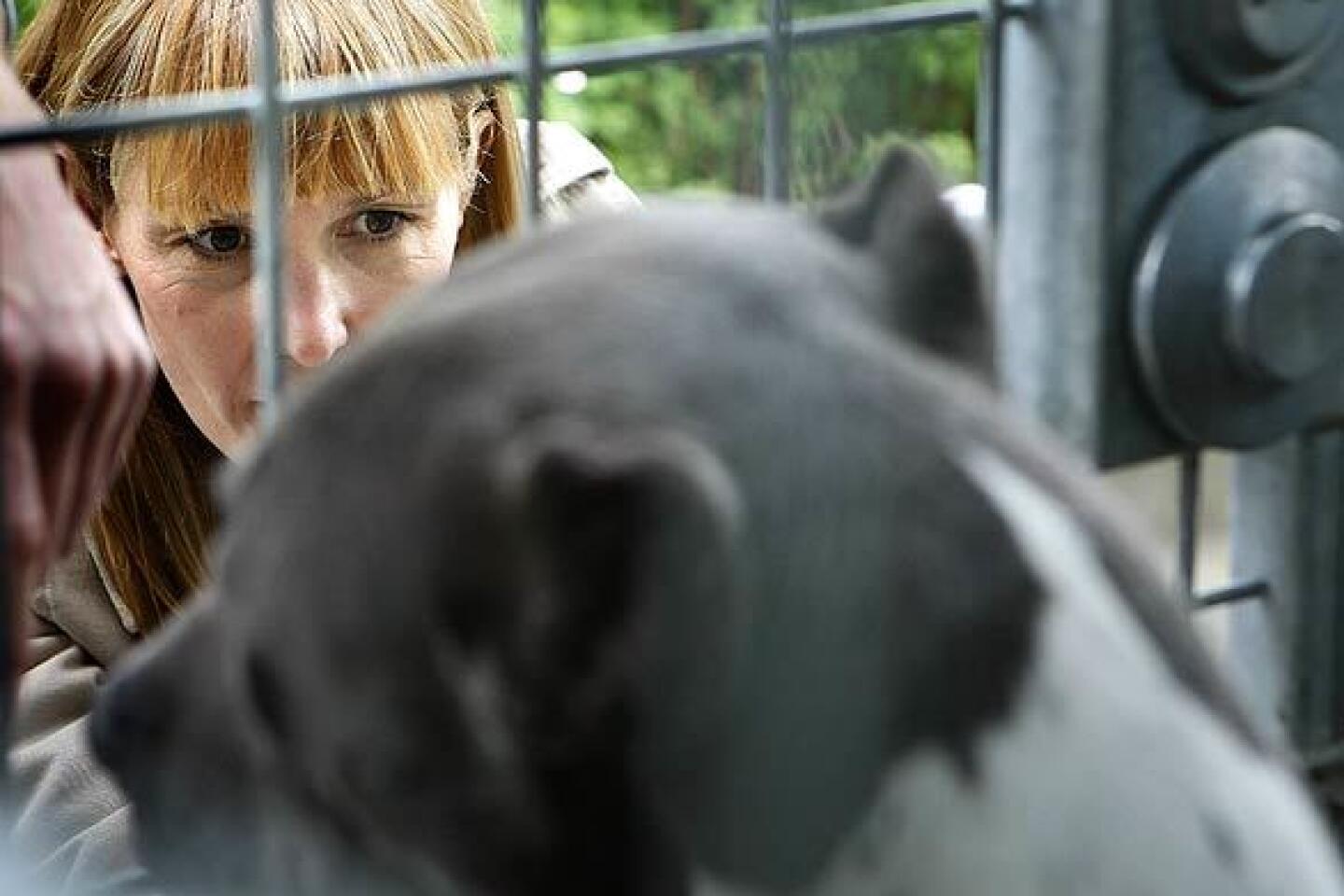Animal cruelty crackdown in Los Angeles has results
Furious that his girlfriend had broken up with him and stopped taking his calls, Steven Butcher decided to take his anger out on the couple’s small puppy.
“Every time you . . . don’t pick up the phone, I am beating the dog,” Butcher said in an angry voice-mail message he left for his ex-girlfriend. In a later message, as the dog yelped and cried in the background, he said: “You got some more of the dog getting beat.”
When police officers arrived at Butcher’s Reseda home, they found Nelia, the pit bull puppy, shivering in a sink with cold water running over her. The animal’s jaw had been broken, her eye sockets had been fractured and several of her ribs had been cracked.
Butcher, 23, was charged and convicted last year of animal cruelty -- one of a growing number of serious animal abuse cases in Los Angeles, where police and prosecutors say they are taking crimes against animals more seriously than ever.
The Los Angeles Police Department has devoted five officers and detectives to a task force dedicated to investigating animal abuse and neglect. The county district attorney’s office recently began training a select group of prosecutors to handle animal-related cases and is seeking tougher sentences for repeat offenders.
Los Angeles has become a national model for its stepped-up enforcement of animal cruelty laws, animal welfare experts said.
The efforts by L.A. authorities and others throughout the country have been propelled by a growing public disgust for such abuse and mounting evidence of a link between animal cruelty and other types of crime.
“As a society, we’re just less tolerant of unnecessary and unjustified cruelty to animals,” said Dale Bartlett, deputy manager of the animal cruelty and fighting campaign at the Humane Society of the United States.
In Los Angeles County, records show that during the 12 months that ended in August, the district attorney’s office filed animal cruelty charges in 116 cases, nearly 50% more than in the previous year.
Last year, prosecutors won a rare dogfighting trial against a 42-year-old nurse, who was sentenced to three years in prison. And in a separate case, the first person they had ever charged with a felony for cockfighting was convicted.
Randall Lockwood, an expert on animal abuse and a senior vice president at the American Society for the Prevention of Cruelty to Animals, said Los Angeles had adopted one of “the more progressive approaches” in the nation in dealing with crimes against animals.
“It’s something that’s needed in more major cities,” he said.
The Los Angeles City Council created the Animal Cruelty Task Force in 2005, following a proposal by Councilman Tony Cardenas. In backing the measure, LAPD officials cited studies finding that animal abusers were often involved in other crimes such as drug trafficking, child abuse and domestic violence.
Task force detectives said they have seen the connection for themselves.
In the case of Nelia, the beaten puppy, police said her owner also threatened to kill his girlfriend during some of his phone calls. He was sentenced last year to 270 days in jail for animal cruelty, placed on five years’ probation and ordered to undergo counseling. The puppy survived and was adopted out when authorities suspected that Butcher’s ex-girlfriend might reconcile with him, police said.
The task force investigates nearly 300 reports of animal abuse and neglect each year. Its successes include 57 arrests for cockfighting and several arrests for deadly violence against animals.
In 2006, LAPD officers stopped Gene Speer when they noticed him walking along a Hollywood side street with blood all over his shirt. Speer was carrying a backpack. When officers looked in the bag, they found a dead rat terrier that belonged to his roommate.
Speer, 34, told police that the dog, Nehi, had bitten him and he had struck out in self-defense. But LAPD Det. Susan Brumagin, a member of the task force, said officers found animal feces on the carpet and believed that Speer beat the dog to death with a shoe after the animal defecated. He was sentenced to 16 months in prison.
“None of the people we arrest think they could go to prison for hurting a dog or a cat,” Brumagin said. “They don’t show remorse. . . . They’re more shocked and surprised.”
From a small office on the 18th floor of the downtown criminal courthouse, Deputy Dist. Atty. Deborah Knaan oversees all of the district attorney’s prosecutions for animal abuse.
A former manager in the city’s Department of Animal Services, Knaan offers advice to prosecutors about animal cases and organizes training programs for prosecutors and police officers on identifying signs of cruelty and neglect. She has also written a proposed law that Los Angeles County Dist. Atty. Steve Cooley is sponsoring to ban people convicted of animal cruelty from owning pets for up to life.
During a recent interview, Knaan sat behind a desk adorned with a photo of herself cuddling her three dogs -- Ziggy and Spice, her two Jack Russell terriers, and Elmo, a Dachshund-Chihuahua mix -- and spoke about the need to protect animals.
“They cannot talk. They cannot get away. . . . They’re totally vulnerable,” she said. “It’s our huge obligation to them to take care of them.”
Last year, Knaan filed felony cockfighting charges against Israel Ramirez, marking the first time the district attorney’s office had treated cockfighting as a felony since state lawmakers changed the law in 2006 to allow prosecutors to do so for repeat offenders.
Ramirez, who had three prior convictions for cockfighting-related offenses, had been arrested at his home in South Los Angeles in the middle of what police said was a contest, or “Derby Day.” Officers seized about 50 roosters and numerous knives used to attach to the birds’ spurs for fighting.
Knaan said Ramirez charged spectators $20 each to watch the fights and sold them sandwiches and beer. “It was a real moneymaking sporting event,” she said.
Ramirez was sentenced last month to 360 days in jail and ordered to undergo a year of animal abuse counseling.
Last year, prosecutors charged Jerome Woods, 55, with dogfighting for the third time in a decade.
In 1998, the former carpet layer spent one day in jail for dogfighting. In 2000, he was convicted again and incarcerated for 23 days.
Woods’ latest trouble came when the task force searched his South L.A. home and found 11 pit bulls, all but one locked in chain-link cages. Several of the dogs bore scars on their heads and forelegs -- injuries consistent with fighting. Police also found three treadmills, commonly used to train fighting dogs, and a blood-spattered plywood enclosure used for fights.
Woods pleaded guilty in June and was sentenced to five years in prison -- the longest sentence in a Los Angeles dogfighting case since prosecutors started keeping comprehensive records in 1996.
“It lets other dogfighters know that . . . they’re not going to get a slap on the wrist like Mr. Woods did in the past,” Knaan said.
“We reflect society, and society feels that it should be taken seriously.”
More to Read
Sign up for Essential California
The most important California stories and recommendations in your inbox every morning.
You may occasionally receive promotional content from the Los Angeles Times.















